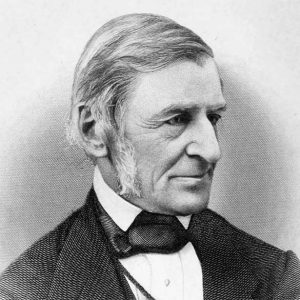Atwood, Sara. “Black Devil and Gentle Cloud: Ruskin and Emerson at Odds” Nineteenth-Century Prose. 40.2: 129–62.
Bauer, Sylvie. “Percival Everett’s Grand Canyon Inc.: Self-Reliance Revisited” CRevAS 43: 257–68.
Biers, Katherine. “Stages of Thought: Emerson, Maeterlinck, Glaspell” MD 56: 457–77.
Bilwakesh, Nikhil. “Emerson’s Decomposition: Parnassus” NCF 67: 520–545.
Boatright , Michael D. and Mark A. Faust. “Emerson, Reading, and Democracy: Reading as Engaged Democratic Citizenship” Democracy and Education. 21.1: 1–9.
Boudreau, Kristen. “The Haunting of History: Emerson, James, and the Ghosts of Human Suffering,” Stanley Cavell, Literature, and Film. 80-95.
Buell, Lawrence. “Inventing the Public Intellectual: Conflicting Models,” Intellectual Authority and Literary Culture. ed. Gunter Leypoldy. Heidelberg: Universitatsverlag Winter, 2013, 27-44.
Bufkin, Sydney. “Contending Forces’ Intellectual History: Emerson, Du Bois, and Washington at the Turn of the Century” Arizona Quarterly. 69.3: 77–98.
Crane, Gregg. “Intuition: The ‘Unseen Thread’ Connecting Emerson and James” MIH 10: 57–86.
Emerson, Edward Bliss. Caribbean Journal and Letters, 1831–1834 ed. José G. Rigau-Pérez bibliotecadigital.uprrp.edu/cdm/ref/collection/librosraros/id/1701
Eckel, Leslie Elizabeth. Atlantic Citizens. Edinburgh University Press, 2013.
Estimating Emerson: An Anthology of Criticism from Carlyle to Cavell, ed. David LaRocca. New York: Bloomsbury, 2012.
Foust, Matthew. “Experience as a Prelude to Disaster: American Philosophy and the Fear of Death” Mortality 18: 1–16.
Friedl, Herwig. “Out of Bounds: American Visions of the Thinker and of Thinking,” Intellectual Authority and Literary Culture. ed. Gunter Leypoldy. Heidelberg: Universitatsverlag Winter, 2013, 205-217.
Fujita, Yoshiko. “Teaching Emerson’s Nature in a Japanese University” Emerson Society Papers 24.1: 1, 4–5.
Garvey, T. Gregory. “Anarchy and Public Discourse: Emerson, Lincoln, and the ‘Mobocratic Spirit’ of the 1830s” American Nineteenth Century History. 14: 161–82.
Golden, Mason. “Emerson-Exemplar: Friedrich Nietzsche’s Emerson Marginalia: Introduction” Journal of Nietzsche Studies. 44: 398–408.
Golden, Mason. “Translation and Excerpts” Journal of Nietzsche Studies. 44: 409–431.
Hudspeth, Robert N. “The Collected Works of Ralph Waldo Emerson” Nineteenth-Century Prose 40.2 (2013): 1–104.
Isenberg, Sarina. “Translating World Religions: Ralph Waldo Emerson’s and Henry David Thoreau’s ‘Ethnical Scriptures’ Column in The Dial” Comparative American Studies. 11: 18–36.
Kaag, John. “Fallibility and Insight in Moral Judgment” HumanS 36: 259–75.
Kevorkian, Martin. Writing Beyond Prophecy. LSU Press, 2013.
Kramp, Joseph M. “From Emerson to Erikson: Methodological Reflections on a Common, Anti-American Approach to Biography” JPsychohist 41: 44–51.
LaRocca, David. Emerson’s English Traits and the Natural History of Metaphor (Bloomsbury).
LaRocca, David. “Performative Inferentialism: A Semiotic Ethics” Liminalities 9: 1–26.
LaRocca, David. “Not Following Emerson: Intelligibility and Identity in the Authorship of Literature, Science, and Philosophy” The Midwest Quarterly. 54: 115–35.
Luttrell, Rosemary. “Virginia Woolf’s Emersonian Metaphors of Sight in To the Lighthouse: Visionary Oscillation” JML 36, iii: 69–80.
McMillin, T. S. “The Discipline of Abandonment: Emersonian Properties of Transdisciplinarity and the Nature of Method,” Nineteenth-Century Prose. 40.2: 105–28.
Meehan, Sean Ross. “Ecology and Imagination: Emerson, Thoreau, and the Nature of Metonymy” Crit 55: 299–329.
Morris, Saundra. “Whim Upon the Lintel: Emerson’s Poetry and a Politically Ethical Aesthetic” Nineteenth-Century Prose. 40.2: 189-216.
Musil, Robert. “Self-Utopia and the Robber’s Ethic” GR 88: 64–82.
Rhu, Lawrence. “Emersonian Affinities: Reading Richard Ford Through Stanley Cavell,” Stanley Cavell, Literature, and Film 217–229.
Richards, Jason. “Emerson and the Gothic” Nineteenth-Century Prose. 40.1: 61–90.
Robinson, David M. “Stanley Cavell, ‘Aversive Thinking,’ and Emerson’s ‘Party of the Future,’” Stanley Cavell, Literature, and Film: The Idea of America. Eds. Andrew Taylor and Áine Kelly. New York: Routledge, 42-56.
Robinson, David M. “Emerson, Modern Literature, and the Question of Goethe” Nineteenth-Century Prose 40.2: 163–180.
Ronan, John. “Self-Reliance in Emerson’s Sermons and Essays: First Series” Nineteenth-Century Prose. 40.2: 181-188.
Schweizer, Harold. “Are We Not Beautiful?” Nineteenth-Century Prose. 40.2: 217-226.
Stewart, Garrett. “Self-Relayance: Emerson to Poe,” Stanley Cavell, Literature, and Film. 57-79.
Tindol, Robert. “Emerson’s Nature as an Early Manifestation of the Biological Sublime” Changing English 20: 409–419.
Urbas, Joseph. “‘Bi-Polar’ Emerson: ‘Nominalist and Realist’” Pluralist 8.2: 78–105.
Wright, C. Conrad. “‘Soul Is Good, but Body Is Good Too’” Journal of Unitarian Universalist History. 37: 1–20.
Benedetta Zavatta’s “Historical Sense as Vice and Virtue in Nietzsche’s Reading of Emerson” Journal of Nietzsche Studies. 44: 372–97.
